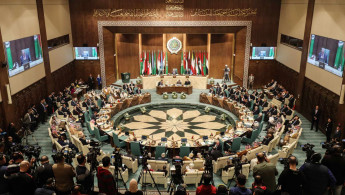Arab League ignores Palestinian call to condemn UAE for normalisation deal with Israel, condemns Turkey
Foreign ministers from Arab League countries slammed Turkey and Iran during a virtual meeting on Wednesday, The National reported, while ignoring Palestinian calls for the controversial UAE-Israel normalisation to be condemned.
A toned-down draft resolution, proposed by Palestine, that responded to the UAE's normalisation deal with Israel did not have the backing of other Arab League members, Deputy Secretary-General Hossam Zaki said after the meeting.
The rejected resolution affirmed Palestinian rights but steered clear of harshly condemning the UAE for its normalisation agreement with Israel.
An amended draft resolution calling for a two-state solution, without reference to the peace accord, also did not pass, according to Zaki.
Zaki told a news conference in Cairo that the foreign ministers failed to reach a compromise on a resolution on the UAE-Israeli deal because of differences between the Palestinians and Emiratis on the wording of the draft.
|
"A draft resolution needs more time and extensive consultations ... we hope in the future to reach an agreed form," he said.
But Al-Maliki said he was able to prevent the Arab League from issuing a statement that gave Arab support for the UAE before a signing ceremony for the Israel normalisation deal at the White House next week.
"Palestine demanded that this condemnation be added to the statement and that without it there would be no Palestinian approval," Al-Maliki told Palestinian TV Wednesday evening.
Instead, the Arab League summit appeared focused on the UAE's rivals Turkey and Iran.
Deputy Secretary-General of the Arab League Hossam Zaki said Iran and Turkey were seeking ways to interfere in the affairs of Arab countries.
Egypt's foreign minister echoed this sentiment, saying Cairo "will not stand motionless in face of the Turkish greed that is especially being shown in northern Iraq, Libya and Syria".
Egypt Foreign Minister Sameh Shoukry said Cairo backs Iraq "against continuous Turkish aggression into its borders" and supported measures it "is taking against these intransigent instances of interference", according to The National.
Ankara launched a cross-border assault against Kurdish rebels in Iraq's north in June.
The UAE, which has comed under fire for its normalisation deal with Israel, said Turkey's recent action in the Eastern Mediterranean undermined "security and safety of maritime traffic in the Mediterranean waters".
UAE Minister of State for Foreign Affairs, Anwar Gargash, said Iran continues to threaten the security and safety of maritime traffic and energy supplies in the waterways of the region".
Turkey's Foreign Ministry has rejected the Arab League's accusations. "We do not take Arab League decisions against Turkey seriously," it said in a statement released Thursday.
'Earthquake'
Palestine's Foreign Minster Maliki told the Arab League in Wednesday's meeting that the PA called for the emergency meeting in response to the UAE-Israeli deal, announced on 13 August.
He said one Arab League member opposed a Palestinian request to add an item to the meeting agenda, an apparent reference to the draft resolution on the deal. Al-Malki did not name the country.
The meeting, which was presided over by Palestine, was held online due to the coronavirus pandemic.
Al-Malki described the deal between the UAE and Israel as "an earthquake" that hit the Arab consensus over the Palestinian cause and he urged Arab foreign ministers to reject the deal "otherwise our meeting will be considered a blessing or collusion with it, or a cover for it".
Palestinian factions unaffiliated with the Palestinian Authority were similarly disapointed with the Arab League, The New Arab's Arabic-language service reported.
|
Hamas, which rules the Gaza Strip, said the developments showed "a clear abandonment by the Arab League of its position at the Beirut summit, which stipulated Palestinian rights before normalisation".
An official source in the Palestinian foreign ministry has denied rumours that Ramallah was considering withdrawing from the Arab League over the controversy, Arabi 21 reported.
Normalisation
The UAE and Israel announced the deal to establish full diplomatic relations on 13 August. Most of the Arab world has long rejected diplomatic ties with Israel in the absence of a peace deal establishing a Palestinian state on lands captured by Israel in 1967.
That steadfast support for the Palestinians, however, has begun to weaken in recent years, in a large part due to a shared emnity for Iran.
The Palestinians have repeatedly voiced their rejection of the US-brokered Israel-UAE deal as trading away one of the few cards they have in moribund peace talks with Israel.
The UAE presented the agreement, which is scheduled to be signed on 15 September, as taking Israel's planned annexation of parts of the occupied West Bank off the table. But Prime Minister Benjamin Netanyahu insisted the pause was "temporary".
 |
Agencies contributed to this report.
Follow us on Facebook, Twitter and Instagram to stay connected





 Follow the Middle East's top stories in English at The New Arab on Google News
Follow the Middle East's top stories in English at The New Arab on Google News
![Israeli forces ordered bombed Gaza's Jabalia, ordering residents to leave [Getty]](/sites/default/files/styles/image_330x185/public/2176418030.jpeg?h=a5f2f23a&itok=_YGZaP1z)

